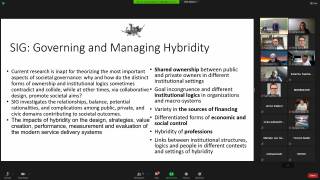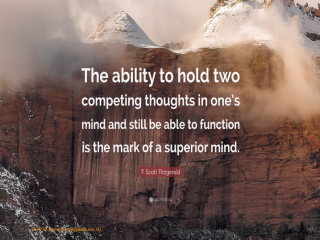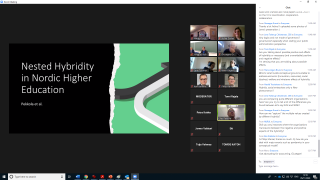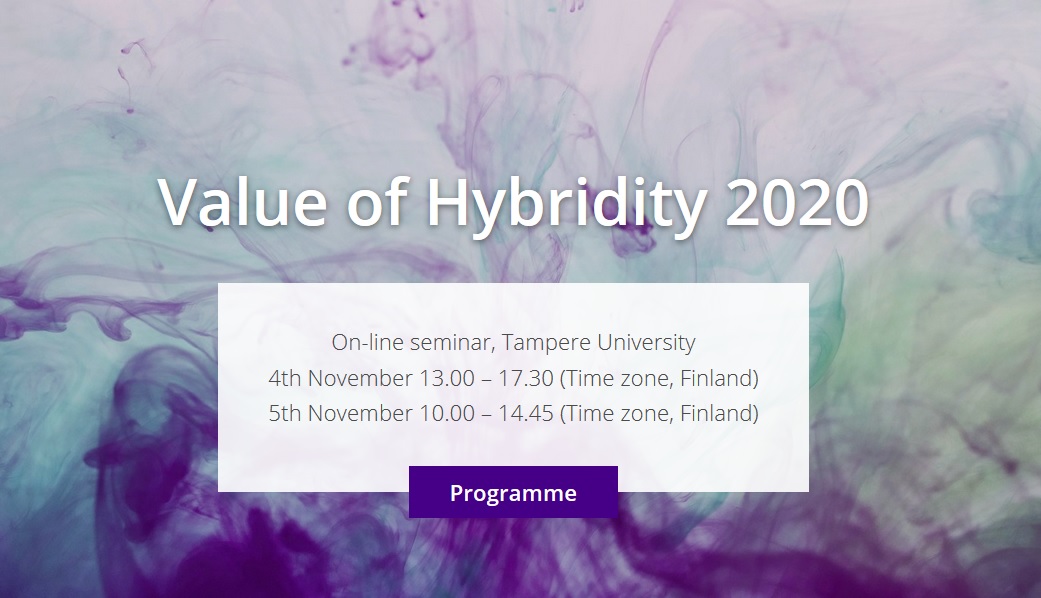“Hybrid is free space without any discipline. We can learn from each other.” – Giuseppe Grossi
“The ability to hold two competing thoughts in ones mind and still be able to function if the mark of a superior mind” – F. Scott Fizgerald, quoted by Philip Karre
Value of Hybridity 2020 Online Seminar organised by University of Tampere, IRSPM Special Interest Group (SIG) on Governing and Managing Hybridity and HYPER took place 4th to 5th of November 2020. The two-day seminar gathered together over 100 participants from over 25 different countries.



The first seminar day focused on conceptualising hybridity and value creation in hybrid context, and introducing experiences from three different continents. Jarmo Vakkuri and Jan-Erik Johanson from Tampere University opened the seminar and introduced their recent work on hybridity, work of IRSMP Special Interest Group, and HYPER project. The first session was opened by Adina Dudau from the Glasgow University, who shared her work on multidimensionality of hybrid accountability. Giuseppe Grossi from the Nord University continued the session by presenting some preliminary findings on dealing with multiple values in hybrid contexts.
Matti Skoog from Åbo Akademi discussed accountability dyslexia in Swedish school sector. Joaquim Rubens Fontes-Filho and Eduardo Rodrigues da Silva from Brazilian School of Public Administration at the Getulio Vargas Foundation introduced their study of hybrid companies in Brazilian oil and gas industry, and Michael O´Neill from University of Ottawa and Jennifer Hall from University of Victoria introduced their research on hybridity of Canadian Federal Government institutions with corporate form yet public missions.
The second seminar day focused on corporatization and modeling hybrid value. Session was opened by Anna Thomasson from Lund University. Thomasson discussed her research on corporatization as strategy for public service provision, and interplay of different institutional logics in public services. Lene Tolstrup from Copenhagen Business School and Giuseppe Grossi from Nord University continued by introducing their longitudal study of the institutionalization of the Danish State Guarantee Model for transport infrastructure. Harald Torstensein from the Arctic University of Norway discussed cultural differentiation and governance challenges in hybrids. His multiple-case study is focused on technical services on water and sewage management.
Seminar day was continued by Harri Laihonen from the University of Eastern Finland, who opened the last session by introducing practice-oriented evaluation project conducted as part of the HYPER project, and identified managerial evaluation challenges and key take-aways for developing evaluation frameworks. Philip Karre from the Erasmus University Rotterdam explored positive and negative effects of hybridity on value creation in social enterprises (SEs). Elias Pekkola from Tampere University spoke about nested hybridity in higher education related to his chapter in the recently published book “Hybrid Governance, Organisations and Society: Value Creation Perspectives”.
Sessions demonstrated conceptual richness, relevance, and divergent empirical manifestations of hybridity. One of the goals of the seminar was to develop innovative research agenda for the research of hybridity, hybrid governance and organizations. On-going projects received lots of feedback during the sessions, and new opportunities were discussed. One of the SIGs key missions is to explore, unite and coordinate the research related to governing and managing hybridity. In addition to new points of departure for future research, discussions also highlighted the importance to broader communicate hybridity to academic community and practitioners, and bring together different disciplines.
Hybridity is discussed across different disciplines in different ways. Bringing together different perspectives and having more dialogue between disciplines could allow richer analysis. Opportunities and risks of hybrids were widely discussed during different sessions. Topical point raised during the discussions related to COVID-19 pandemic was how hybrids and hybridity can contribute or disturb resilience. Building international network of scholars interested in governing and managing hybridity is an important step towards cross-disciplinary and rich future research activities in the research area.
Presentation are visible in event page
Special thanks for all the participants for active discussions and speakers for presenting interesting new research in the area!

